How Generative AI Is Transforming Customer Support in 2025

The future of customer support is already here, and it comes in the form of generative AI for customer support.
This powerful technology, capable of creating human-like content, is transforming the way organizations handle customer support by automating tasks, enhancing personalization, and providing real-time assistance.
But what should you expect when implementing generative AI for customer support in your operations?
In this blog post, we will peek into the world of generative AI for customer support, exploring its evolution, benefits, and challenges. We will also provide insights on how you can prepare your organization for generative AI adoption.
Understanding generative AI in customer support

Generative AI enhances customer service by understanding inputs deeply and going beyond training data. It can generate more relevant and personalized responses.
The progress of generative AI is attributed to advancements in large language models and deep learning techniques. These advancements allow AI models to interpret extensive text and create unique content from their analysis.
Generative AI, by automating routine tasks, processing substantial data, and responding to frequently asked questions, can substantially improve the customer experience in contact centers and support services. Anticipated to exceed $22 billion by 2025, the generative AI market is set for substantial growth, reflecting a CAGR of 27.02%. (Source)
Role of generative AI work in customer support
In customer support scenarios, generative AI models like ChatGPT analyze customer queries and generate appropriate responses by referencing their vast training data. One of the key advantages of using Generative AI in customer support is its ability to filter out complex queries and route them to human customer support teams, allowing them to focus on more challenging issues.
Organizations, by integrating Generative AI, can optimize their support processes, improve personalization, and offer real-time assistance, thereby increasing customer satisfaction and revolutionizing the delivery of customer service.
Harnessing the strengths of conversational AI, Devrev’s deflection represents a shift from traditional bots. Deflection refers to the ability of AI chatbots to automatically provide first line of responses to common customer queries. Using natural language processing (NLP) techniques, the chatbot can understand the customer's query and provide a response that is personalized, contextual, and conversational. The chatbot does not simply direct the customer to a website or PDF where they have to search for the answer. Instead, it provides a simple, direct, and easy-to-comprehend answer to their question.
Through deflection, AI chatbots can provide initial responses to customer queries automatically. As the chatbot performs this operation repeatedly, it learns in the process and constantly improves the accuracy and relevance of its response with every answer that it generates. An AI-powered chatbot that is self-learning is more capable than a traditional chatbot trained by a decision tree or built using flow-builders.
DevRev’s Customer Experience Agent widget can be deployed in minutes and is unrestricted by the limitations of the number of steps in flow builders. It is powered by Computer by Devrev. Deploying agent is as easy as point, click, and deploy. There is zero decision tree management involved in the process.
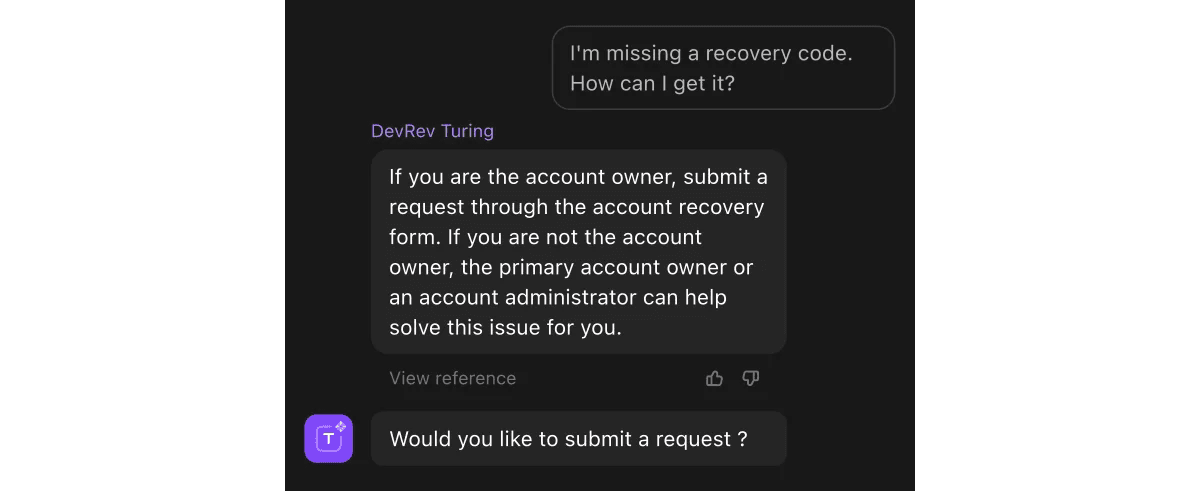
This evolution marks a departure from building conventional bots, ushering in a more dynamic conversational AI landscape. Explore the transformative nature of deflection and its impact on reshaping customer support in the evolving realm of AI-powered conversations.
Key benefits of implementing generative AI for customer support
Implementing generative AI in customer support comes with numerous benefits. These benefits include streamlining support processes, enhancing personalization and engagement, and providing 24/7 real-time support.
However, the integration of generative AI in customer support comes with its own set of hurdles. Organizations must tackle concerns surrounding data privacy and security, maintain a balance between the need for human interaction, and handle complex queries and AI hallucinations to secure the success of their integration.
Generative AI streamlines support processes to optimize agent performance
By automating routine tasks and processing large amounts of data, generative AI can significantly streamline support processes, allowing agents to focus on more complex issues and improving overall efficiency.
For instance, generative AI can be used to auto-summarize contact summaries and provide disposition codes directly to CRM systems, simplifying post-call processing and minimizing manual work for agents.
Furthermore, generative AI models can be quickly deployed and require minimal computing costs, making them an attractive option for businesses of any size looking to scale their customer support operations. By automating tasks such as ticket routing, issue resolution, and customer service, generative AI can significantly improve agent productivity and the overall customer experience.
Routing
AI chatbot, as a first line of response, can handle a significant volume of incoming queries as most of them can be resolved using information available in the knowledge bases. But when a customer raises a query that is beyond the scope of what’s available in the knowledge repositories, the AI chatbot must promptly and seamlessly escalate the conversation to a human agent who can quickly resolve the issue that the customer is facing.
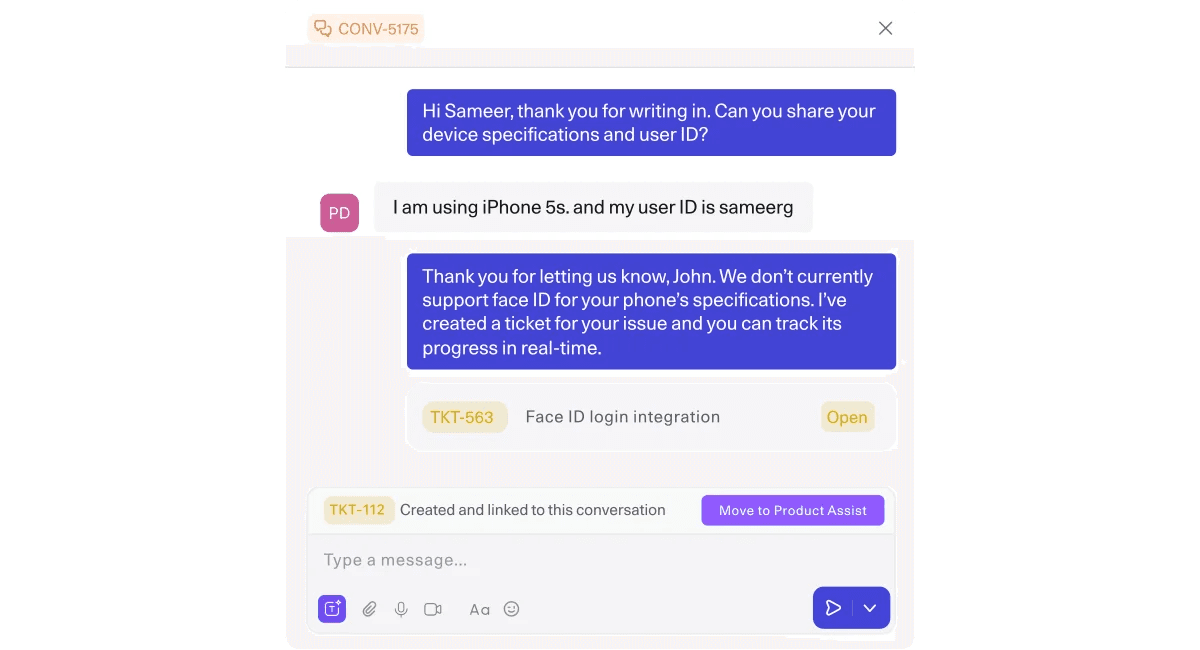
But how does an AI chatbot handle this process given that there are numerous steps involved in making the escalation seamless for a customer, who may be feeling agitated? Firstly, the AI chatbot creates a ticket on its own once it understands that the customer's query requires human intervention and can only be resolved by a human agent. Next, it goes above and beyond by choosing which agent to transfer the ticket to.
Computer can identify the right customer support agent or product manager to fix the problem and automatically assign the ticket to the right person.
Summarize
In customer support, the time taken to resolve a query is of utmost importance. It directly affects customer satisfaction scores and the number of queries that an agent can resolve in a day.
Oftentimes, a customer query cannot be fully resolved by a chatbot or a Level 1 Customer Support agent. This typically occurs when a customer's issue is more complex and beyond the scope of what's available in the knowledge base. The Level 1 agent may also escalate the conversation when a customer has already tried multiple solutions, but the problem persists. In such cases, the query gets escalated to a Level 2 Support agent or engineer.
With Computer by Devrev, customer support agents can use a simple “/summarize '' command to get the gist of the conversation without losing the context or the finer details. The assigned customer support agent can then quickly get on to resolving the problem, drastically reducing the customer wait time and queueing time.
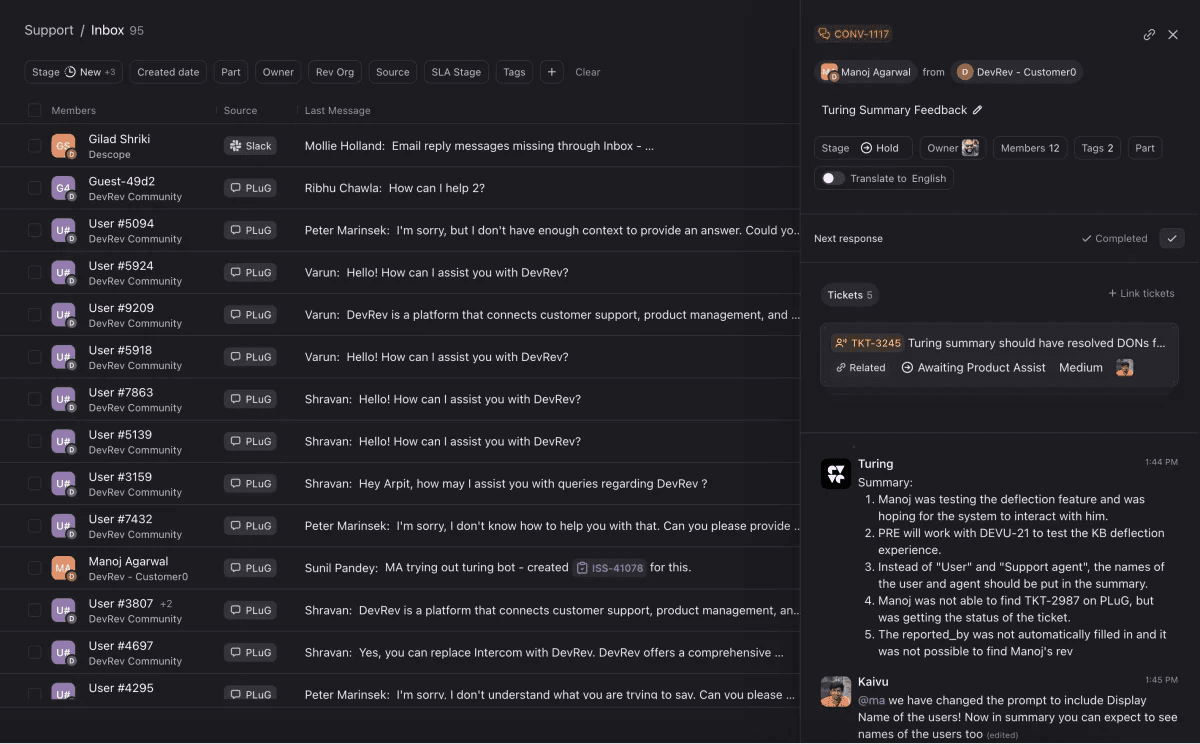
Rephrase
While conversing with customers, there is no room for miscommunication in order to ensure a faster resolution time. The responses to a customer, who is already upset or frustrated, must be simple and comprehensive. And many times, Generative AI can be used to rephrase technical or complex language into simpler terms that are easier for customers to understand. In other cases, Generative AI can be used to change the tone of a response as well to sound more empathetic and understanding while conversing with a customer who sounds very concerned.
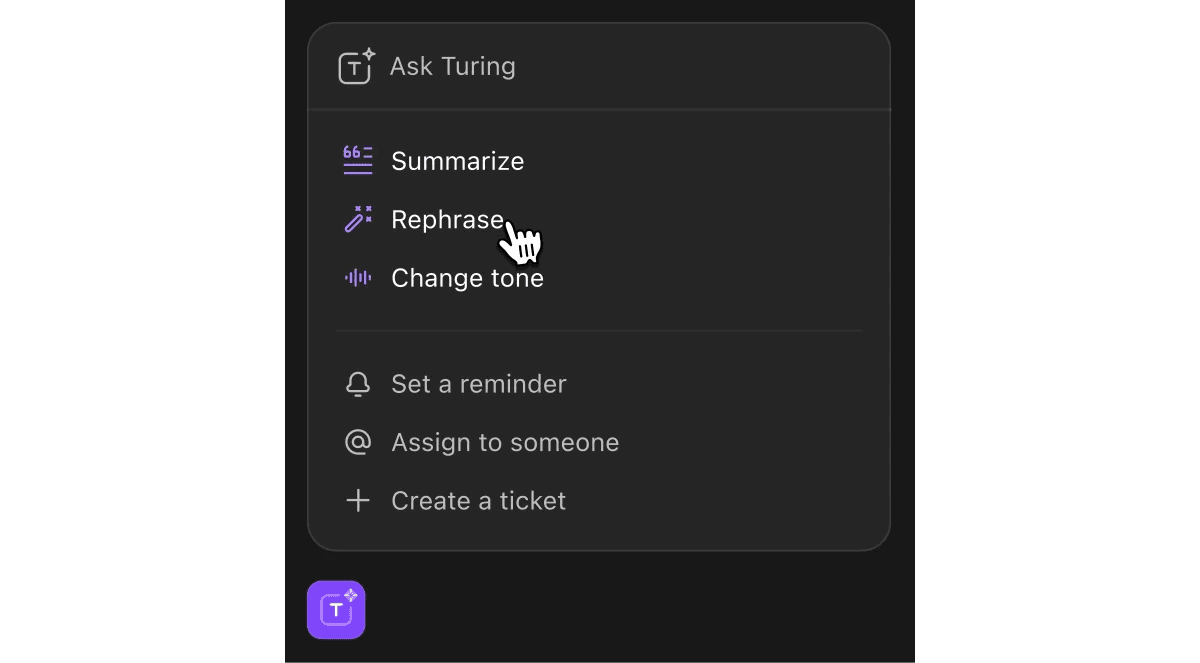
With Computer for Support Teams, support agents can use built-in AI capabilities to rephrase responses, adjust tone to casual, friendly, or professional styles, and simplify technical language. This ensures customers receive clear, empathetic, and easy-to-understand answers, even in complex or sensitive situations.
AI enhances personalization and engagement to build trust and reliability
Generative AI can greatly enhance customer engagement by providing personalized responses and recommendations based on customer data and preferences. Through machine learning algorithms, it analyzes past interactions, purchases, and preferences to create tailored experiences and personalized recommendations for individual customers.
In the context of customer support, generative AI can be used to generate dynamic individualized responses based on customer data and historical interactions, improve the overall customer experience, and build trust in the support process.
By offering personalized support through the customer service function and paying attention to customer feedback, companies can achieve improved customer satisfaction, better meet customer expectations, and drive positive business outcomes.
AI chatbots serve many more functions even after a customer query has been passed on to a Customer Support agent for intervention and resolution. Agents can put the natural language processing capabilities of AI to use to synthesize a tailored response that takes information from knowledge bases and past customer interactions. Agents can use Generative AI to create a personalized and conversational response that directly addresses the customer's question, instead of having to type it out themselves and spend time on wording it properly.
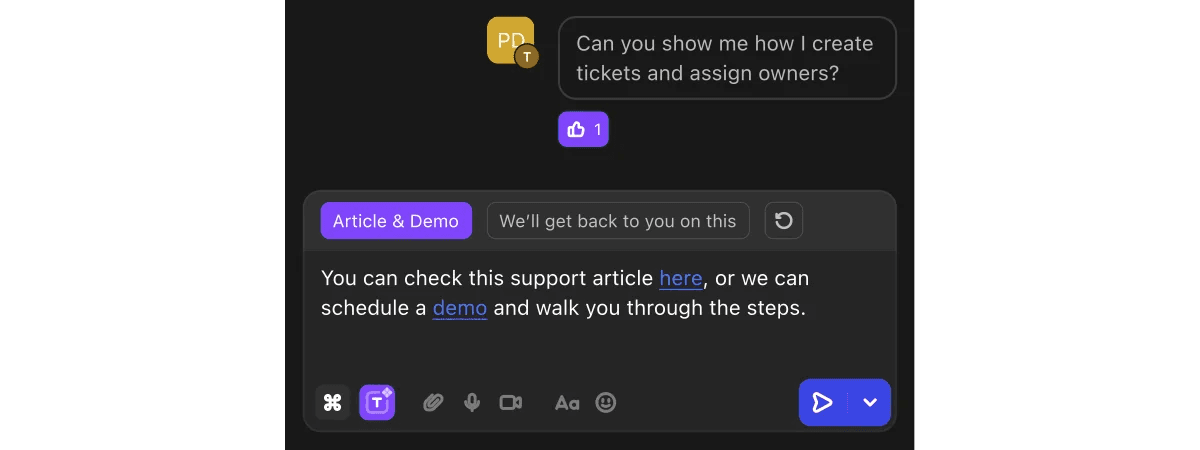
With recommended replies with Computer for Support teams, agents and support engineers can resolve customer queries faster.
Integrating generative AI provides 24/7 real-time support, reducing overall resolution times
Presently valued at over $13 billion, the global generative AI market is poised for remarkable expansion. Generative AI enables organizations to offer 24/7 real-time support, ensuring that customers can access assistance whenever they need it. By automating customer support processes like ticket routing and issue resolution, generative AI can help reduce resolution times and prevent delays in providing support.
Boosting problem resolution efficiency with generative AI automation

Generative AI significantly enhances problem-resolution efficiency by automating repetitive tasks in the customer support workflow.
Through advanced natural language processing, it quickly analyzes customer interactions, identifies key issues, and generates concise summaries. This allows customer support agents to focus on addressing complex problems rather than spending valuable time on routine tasks.
The automated process ensures a quicker and more streamlined resolution, ultimately elevating the overall efficiency of problem-solving in customer support.
Like, you can simplify your resolution workflow using DevRev's slash commands snap-in. This tool optimizes your tasks, saving time and reducing workload. Integrated seamlessly into your workflow, it provides direct access to Computer's capabilities within any text field.
Whether engaged in customer support or project building, these commands offer quick access to specific actions, leveraging Computer for out-of-the-box functions. This integration complements the focus on boosting efficiency in problem resolution through generative AI automation, enhancing the overall customer support experience.
Strategically streamlining ticket routing and enhancing issue resolution
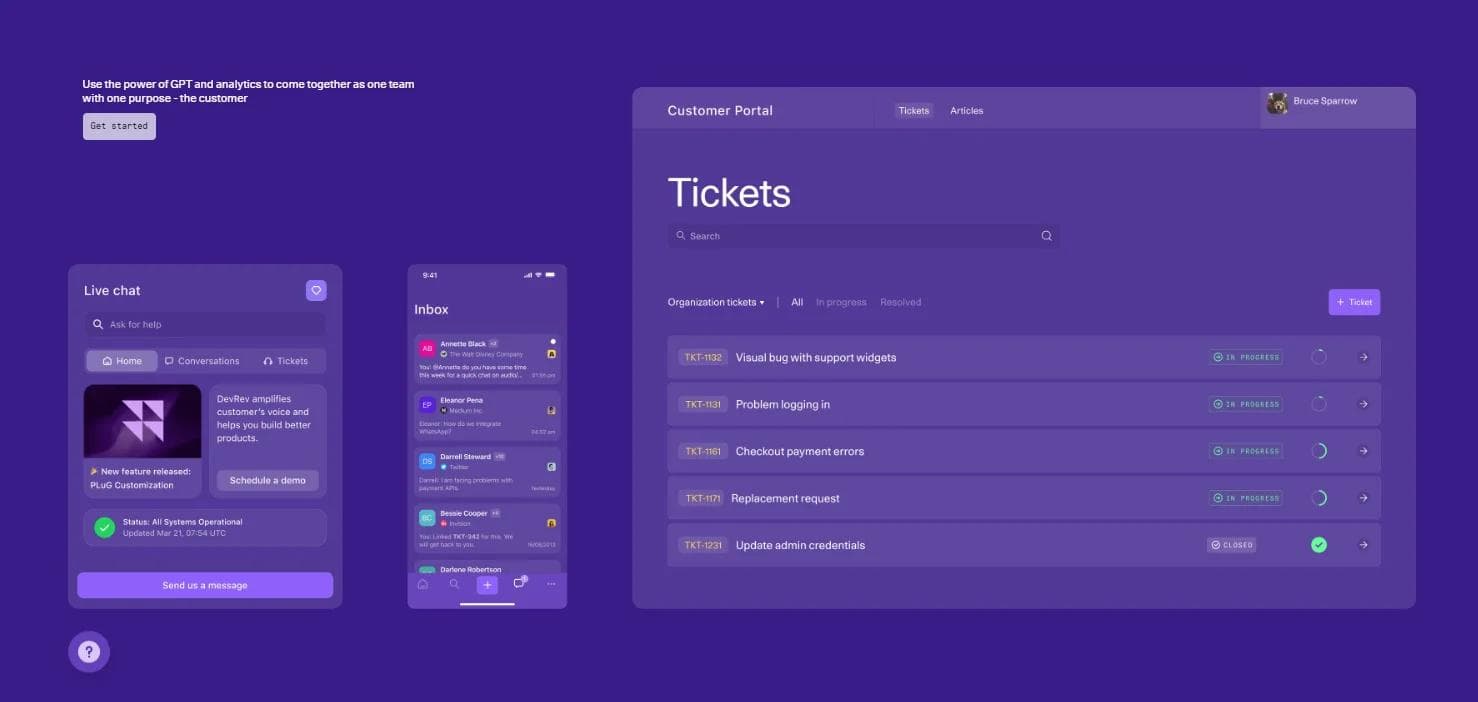
Generative AI plays a pivotal role in strategic ticket routing and issue resolution by leveraging machine learning algorithms. It intelligently categorizes and prioritizes incoming tickets based on their complexity and urgency.
This strategic approach ensures that customer queries are directed to the most suitable agents, minimizing response times and enhancing the overall customer experience. The systematic management of tickets contributes to efficient issue resolution, ultimately improving the efficiency of the entire support system.
DevRev's tickets feature encapsulates a customer's request, ensuring systematic tracking and timely resolution. When generative AI is seamlessly integrated, it strategically routes and prioritizes tickets using advanced machine learning algorithms. This intelligent categorization minimizes response times, enhancing the overall customer experience.
The systematic ticket management contributes to efficient issue resolution, making the support system more responsive and customer-centric. As customers file their tickets, generative AI streamlines the process, aligning with the goal of improving the overall efficiency of customer support operations.
Achieving scalability through efficient and cost-effective automation
Generative AI models facilitate scalability through their quick deployment and cost-effective automation. By automating tasks such as ticket routing, issue resolution, and customer service interactions, businesses can efficiently handle a growing volume of customer queries without significantly increasing operational costs.
This scalability is particularly advantageous for businesses of varying sizes, allowing them to adapt and expand their customer support operations seamlessly. The cost-effective nature of generative AI automation makes it an attractive option for optimizing support processes while managing operational expenses efficiently.
AI copilot to your L3 Customer Support
At times, a customer's issue may be complex and beyond the expertise of Level 2 Customer Support agents. Such issues are escalated to Level 3 Support teams. These issues often require attention from those with specialized knowledge or feature enhancements that fall outside the scope of the product's current functionalities. In such cases, having the right insights plays a significant role in paving the way forward for enhancements.
Cluster
Level 3 Support agents have visibility of all the tickets that come into the ticket management software. Large volumes of tickets with details of the issues that customers are facing is a goldmine of information on customer painpoints and aspirations. However, deriving insights from vast amounts of data is virtually impossible without the support of an AI powered system that can identify emerging issues which require significant attention.

DevRev's Computer can cluster similar tickets, allowing support engineers and product teams to gather insights from tickets. By analyzing incoming support tickets, Computer groups similar tickets together, giving support and product teams added visibility and clarity in making decisions around feature enhancements and innovation, reducing the time and effort needed to resolve them. Additionally, with clustering, teams can identify patterns in ticket inflow and ensure that they are addressed before they become widespread.
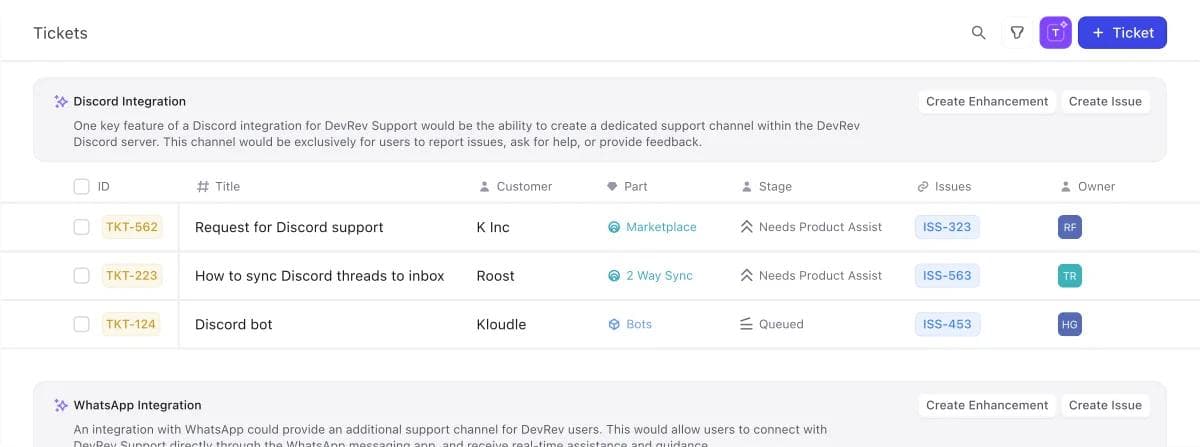
Deduplicate
With Computer, similar tickets are clustered together, allowing us to identify and remove redundant tickets. This reduces the total number of support tickets that a team has to handle. Once tickets are clustered, duplicates can be removed, saving valuable time for the support and product teams.
By removing redundant tickets, the support team can focus on solving unique issues, while the product team can prioritize feature enhancements based on the most common customer pain points.
Converge
Identifying patterns in customer issue tickets not only provides visibility on major problems faced by customers but also enables decision-making for future product enhancements. With this information, product development and management teams can confidently prioritize features that require immediate attention and fast resolution. Generative AI not only elevates Customer Support in any organization but also speeds up the pace of Software Development.
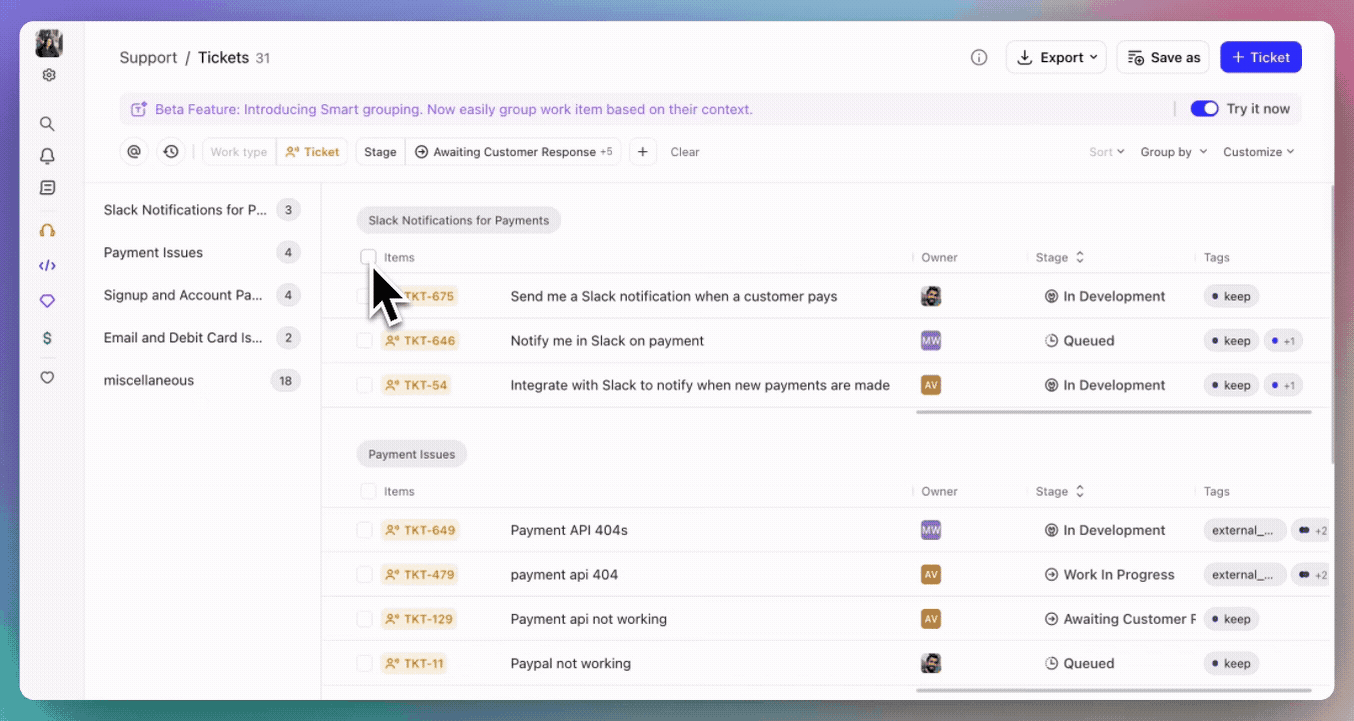
Challenges of generative AI in customer support
While the benefits of generative AI in customer support are clear, it’s important to acknowledge the challenges and limitations that may arise during its implementation. Some of the most pressing concerns include:
Integrating AI models can lead to higher data privacy and security concerns
Data privacy and security take precedence when integrating generative AI, as these models depend on extensive data, which may unintentionally expose sensitive information. Companies like Apple, Samsung, and Verizon have prohibited the use of ChatGPT internally due to the risk of data exposure.
To mitigate these risks, organizations should implement strong safeguards to protect sensitive personal information and maintain consumer trust. One effective approach is to have human agents review AI-generated content before it reaches the customer, ensuring accuracy and data privacy.
Organizations have a difficult time balancing AI and human interaction in the support process
Achieving an optimal balance between AI and human interaction is important to guarantee customer satisfaction and uphold trust in the support process. While generative AI can greatly improve efficiency and personalization in customer support, it’s important not to overlook the value of human touchpoints and empathy in the overall customer experience.
Preparing your organization for generative AI adoption
Generative AI can provide substantial benefits for customer support operations; however, its successful integration necessitates meticulous planning and preparation.
Generative AI tools have seamlessly integrated into modern workplaces. A recent survey reveals that 29% of Gen Z, 28% of Gen X, and 27% of millennials are actively incorporating generative AI tools into their daily office routines.
Source: https://www.statista.com/statistics/1361174/generative-ai-adoption-rate-at-work-by-generation-us/
Notably, in the recent past, large-scale adoption of generative AI stood at a substantial 23%. Looking ahead, the momentum is expected to grow significantly, with projections indicating a surge to 46% in the year 2025.
To ensure a smooth adoption process, organizations should start by defining clear goals and objectives for their generative AI implementation, focusing on areas where the technology can have the most significant impact.
Also, it is important to assess and select the appropriate tools and platforms that align with your organization’s needs and goals, considering factors such as integration capabilities, scalability, and user-friendliness.
By following these steps, organizations can effectively prepare for the adoption of generative AI and unlock its full potential in transforming their customer support operations.
Define clear goals and objectives for AI integration
Establishing clear goals and objectives for generative AI integration is an important step in preparing your organization for its adoption. By pinpointing specific tasks or processes you want to improve using AI, you can guarantee that your investment in generative AI aligns with your overarching business goals and customer support strategy.
Some common goals for generative AI implementation in customer support might include enhancing agent capabilities, analyzing large amounts of data for accurate lead scoring and sales forecasting, personalizing marketing communications, and creating streamlined customer experiences
By clearly articulating your goals and objectives, you can set the foundation for a successful generative AI implementation that drives positive business outcomes.
Evaluate and choose the right generative AI tools
Choosing the appropriate generative AI tools and platforms is another important step in preparing your organization for adoption. Factors to bear in mind when assessing potential solutions include integration capabilities, scalability, and user-friendliness. By choosing the right tools that fit your customer support goals and integrate seamlessly with your existing infrastructure, you can ensure a smooth and successful implementation.
Some examples of popular generative AI tools and platforms include OpenAI, Claude, and Google Bard.
By carefully evaluating and selecting the right generative ai solutions for your organization, you can unlock the full potential of generative ai and transform customer service operations.
Real-world examples of generative AI for customer support
Following real-world examples exemplify how generative AI seamlessly integrates into customer support systems, providing practical solutions for automating responses, improving engagement, and streamlining interactions:
Computer by Devrev
Computer, by DevRev, is a versatile solution for dynamic customer support. Computer seamlessly integrates generative AI into support workflows, enhancing resolution efficiency. By leveraging machine learning, Computer strategically routes and prioritizes tickets, ensuring timely responses. Its Slash Commands streamline interactions and optimize the process.
This highlights how Computer by DevRev empowers support teams with advanced generative AI tools, contributing to a more responsive, efficient, and customer-centric support experience.
DevRev's Computer introduces a paradigm shift in chatbot functionalities, offering two dynamic modes to enhance user interactions and streamline support processes:
Suggestion mode
In this mode, Computer acts as a smart assistant, suggesting answers to user queries. Support agents can review and accept the proposed answer, facilitating a collaborative approach to query resolution.
Auto response mode
Computer takes automation to the next level by automatically responding to user queries. It navigates the knowledge base, generates tailored responses, and gauges user feedback for resolution. If the user finds the answer useful, the conversation concludes seamlessly. If not, Computer intelligently initiates ticket creation or routing based on predefined rules, ensuring efficient query handling.
Additionally, when faced with unclear queries, Computer prompts users to rephrase, promoting effective communication. The option for users to ask more questions ensures comprehensive query resolution, reflecting Computer's commitment to delivering a responsive and user-friendly support experience.
Google's smart compose
Google employs generative AI in its smart compose feature for Gmail. This tool predicts and generates text as users type, offering suggestions to complete sentences. In customer support scenarios, a similar approach can enhance response efficiency in emails, tickets, and live chats, providing immediate, context-aware assistance.
IBM Watson assistant
IBM Watson assistant utilizes generative AI to create advanced virtual assistants for businesses. These assistants can understand user queries in natural language, providing personalized responses. In customer support, Watson Assistant streamlines interactions, addressing queries and offering solutions with a human-like touch, contributing to a more engaging and efficient support experience.
H&M's virtual assistant
Retail giant H&M utilizes generative AI in its virtual assistant for fashion advice. Integrated into their customer support channels, the virtual assistant understands customer preferences, style inquiries, and product-related questions. By generating personalized recommendations and styling tips, H&M's generative AI elevates the fashion advisory experience, demonstrating the versatility of AI in understanding and catering to individual customer needs.
Generative AI for customer support excellence
Throughout this blog post, we have explored the exciting world of generative AI in customer support, discussing its benefits and challenges. As we’ve seen, generative AI has the potential to greatly impact the efficiency and effectiveness of customer support operations, enhancing personalization and engagement and providing 24/7 real-time support.
The journey towards generative AI adoption may not be without its challenges, but with careful planning, preparation, and the right tools, organizations can successfully harness this cutting-edge technology to revolutionize their customer support operations and deliver exceptional customer experiences.
The future of customer support is here, and it’s time for businesses to embrace the power of generative AI.
